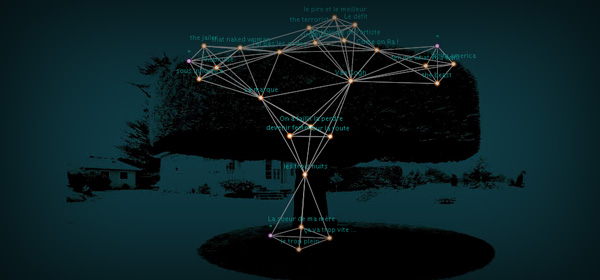
Nicolas Maleve is an artist, free software programmer and ‘data activist’. Born in 1969 in Brussels (Belgium), he currently lives in Barcelona. He has developed multimedia projects and web applications with cultural organizations. His current research focuses on mapping and strategies to visualize the structure of information and metadata.
In collaboration with the group Constant (Brussels), he has developed projects based on subjective and collective cartography (‘Towards a Subjective Collective Cartography’), intellectual property, reappropriation of files (‘Active Archives’) and gender and its relationship with contemporary art (‘Gender Art Net’).
Rafaella Hasaerts Houlstan-born in 1983 in Bocas del Toro (Panama), currently lives in Brussels (Belgium). She is an architect and is a member of the research center at the School of Architecture La Cambre-Horta, the Free University of Brussels. Rafaella and Nicolas collaborate informally since 2007 through the project ‘Towards a Subjective Collective Cartography’, initiated by the nonprofit associations Constant, Recyclart and City Mine (d), along with the graphic producers of Speculoos.
For MDE11 these artists work together performing a collective and subjective exploration of the city of Medellin using different cartographic media. 2 different phases come into resonance with each other. The first take place in Barcelona and Brussels, where the group will be organizing mapping work sessions with groups of people from Medellin; to reactive the senses and revive the memory of the participants to map, that which become collective recollections of the city .
The second phase take place in Medellin. They will invite a number of local cartographers to collect various types of maps of the city. At the same time will be interviewing invited guest cartographers on their productions. The result is a digital device in which they link the maps collected with the contents of the interviews, which make it possible to observe how they relate to, oppose or complement the different views of the city.
Mapping has been reserved for a minority of experts, say Nicolas and Rafaella. Of course, they are convinced that each of us, expert or layman, has lots of ideas, predicates, metaphors, images or fictions about places, landscapes, cities, neighborhoods, etc. “Our job is to tirelessly seek new tools to formalize, unformatted, this pluralistic, subjective knowledge.”
Website
www.encuentros-cartograficos.net
www.constantvzw.org
Links of interest
Towards a subjective collective cartography
Gender Art Net: an experimental mapping project


 Sending data...
Sending data...
Pingback: Sesiones de trabajo cartográfico | MDE11()
Pingback: Recorridos in situ | MDE11()